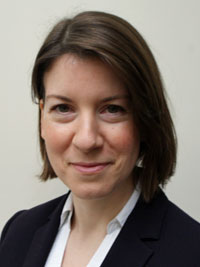Emma Campbell is the Head of Environment and International Transport Analysis at the Department for Transport, leading the Government’s analysis underpinning key policy decisions relating to aviation (including airport capacity), maritime, energy use and innovation. Emma’s team comprises around 70 analysts, providing economic and statistical expertise, in addition to transport modelling and was recently expanded to assess the implications and options for the transport sector following the UK’s decision to leave the EU. Emma’s current position is the culmination of 20 years of experience in the Government Economic Service, which has also included working on a diverse range of issues across government departments such as regulation, environment, and consumer policy.

“…within Government, and indeed within the Department for Transport, the idea that economics and transport are male dominated is becoming increasingly out of date. Economics is a fascinating subject, and transport has a lot of surprisingly interesting issues where economists can (and do) add real value…”
Emma, please can you tell us about your career to date and what made you want to become an economist?
I wanted to become a professional economist ever since I studied A-level economics – I loved the logic of it to explain and forecast things that affect everybody’s quality of life as well as the way people live – key national variables at the macro level, and optimal individual decision making at the micro level.
After my undergraduate degree at the University of Nottingham, I joined the Government Economic Service (GES), wanting to use my economics skills for the public good, rather than to make profits for any individual company. I was initially placed in the Department for Environment, working on housing policy. I then took the jobs that interested me – on climate change, on consumer policy, on economic regulation – going for promotion when I felt ready.
I was very lucky in that the department paid for me to do a Masters in Economics at the University of York – something which happens much more rarely in the current financial climate. I like to think it was a good investment though, as despite rarely using the very technical concepts and proofs that I learned there, it helped to reinforce the economists’ way of thinking and approach to problem solving.
What does your role at the Department for Transport involve on a day to day basis?
My team provides the analytical support to inform and underpin key policy decisions relating to aviation, maritime, transport innovation, and energy and the environment. My role is to steer the analysis that’s being undertaken by the team to reflect departmental priorities, ensuring the team has the right resources and capability to meet current and anticipated future analytical requirements, and to take decisions on the most appropriate approach or level of quality assurance for a particular piece of analysis.

On a practical level, my role involves lots and lots of meetings – I can have days when I’m in back-to-back meetings from the time I start in the morning until the time I leave the office. So, each day is packed, but always varied and interesting.
Your remit is very broad – from different types of transport to energy use and innovation – what are the challenges, and the opportunities presented by this?
On a personal level, the main challenge is having to get your head around multiple different policy or analytical issues at the same time, without having delved into the detail in much depth but with a sufficient level of understanding to be able to take key decisions or provide an appropriate steer to the team.
With so many issues to get your head around, you have to be able to switch your brain between the different topics at pace, and you’re very reliant on your team to be able to explain what the key issues are and prioritise appropriately. Luckily, I have a fantastic team!
Apart from making for a very interesting job, there are also opportunities in terms of being able to take lessons or analytical approaches used to inform decisions in one sector to inform decisions relating to another, and being able to see the bigger strategic picture, rather than working in a modal silo.
Your department has expanded recently due the vote for Brexit. Please can you tell us more about the additional work that is being undertaken?

Economics is known as a very male dominated field, as is transport. How do we encourage more women to get involved?
Economics is relevant to absolutely everybody, from the level of the individual, right up to the state of the national economy, which has a massive impact on our own lives and those of our family and friends. Likewise, transport is just as important for women as it is for men – indeed, on average, women make more trips than men (although they tend to travel less far).
Certainly, within Government, and indeed within the Department for Transport, the idea that economics and transport are male dominated is becoming increasingly out of date. Economics is a fascinating subject, and transport has a lot of surprisingly interesting issues where economists can (and do) add real value – franchising, capacity decisions, Government support to new technology – which should appeal equally to men and women. So don’t let the stereotypes put you off!
Why is diversity of thought in economics so important and what difference can this make?
Diversity of thought in economics is absolutely vital to informing optimal decision making, producing relevant advice and accurate forecasting. With the best will in the world, economists can attempt to be entirely neutral and impartial in their analysis, but they are still conditioned by their own experiences and beliefs.

It’s a time when the economy is facing unprecedented challenges and economists are under great scrutiny. How can economists add value and help to take the economy forward?
Economics is a field with numerous schools of thought and approaches to the modern-day challenges. But it is also a discipline going through somewhat of an identity crisis at present, especially in an era of distrust of “experts”. There’s a big opportunity for economists to make strides forward in new fields, learning the lessons of recent challenges. All historical events provide invaluable real world data – even if it wasn’t predicted before the event – which can only help economists to develop and improve our theories and forecasts of future events.
I strongly believe that economists and their logical approach to problem solving are now more important than ever – with so much emotion involved in many of the big issues of today, economists have a role in setting out clearly and without an agenda, the impacts (costs and benefits) of the different options that may be available to meet those challenges.

What is coming up next for you and the Department for Transport?
The Department has a huge agenda that we are taking forward across all modes, with the simple aim of making journeys better: simpler, faster and more reliable. For me personally, I have been in my current role for a number of years, and I will shortly be moving within DfT to head up the Rail Analysis team, which will present a whole new set of fascinating policy and analytical challenges to get stuck into.
https://www.gov.uk/government/organisations/department-for-transport
https://twitter.com/transportgovuk
https://en-gb.facebook.com/DFTCareers/





